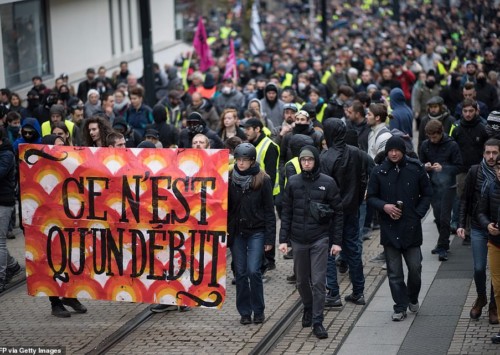French strikes: make or break for Macron
The intensification of action by millions of striking workers in France poses one of the biggest threats to Emmanuel Macron’s presidency.
With thousands of flights and trains cancelled and traffic jams exceeding 600 km just in the capital Paris, France has seen the worst lockdown in over 25 years as millions of workers – both public and private sector – began a strike last week against the pension reforms planned by the government. Though initially it was meant to be a day-long affair, the unions have since declared that they would carry on the strike for at least a week or as long as the government does not pay heed to the ‘voice of the people from the street’.
The matters will come to a head later this week as Prime Minister Edouard Philippe introduces the legislation reforming the pensions, a flagship project of President Macron. The unions have threatened to intensify their action if the government goes ahead with the move. The subject of dispute is indeed critical for France, its government and definitely the people. President Macron has spent three years talking of this move, saying that France offers by far the most generous pensions in the developed world and that these are no longer sustainable as the society ages and as the economy changes with time.
On the face of it, the government does have a point. Certain public sector workers, notably the train drivers, fire fighters and policemen can retire as early as at 52 years of age, ballet dancers at 42 years and public utility workers at 57 as against most private sector retirees moving out only at 62 years. In all, France has about 42 different pension systems, with a fair bit of variance in the terms as well as benefits that the pensioners could claim. With an ageing population, the French pension system, already the most generous in the EU, costs about 14 pc of the nation’s GDP and it is likely to hit an annual shortfall of EUR 19 billion within the next five years.
Macron says he wants to create a unified system that would be fair to all and not have special treatment for certain public sector jobs. The unions are opposing the reform saying that applying any change retrospectively to the working conditions of employees would be a violation of the worker’s rights. The workers also accuse the government of trying to push the reforms while keeping them in the dark about the details.
The public opinion is very curiously placed on the issue. More than half of the French agree that the current system is economically unviable. However, over 74 pc blame the government for the current stalemate and disturbances, saying the government has failed to communicate its plans for the pension reforms in a clear and transparent manner and that a worker is right to be worried about his future.
The unions too accuse the government of not coming clean with the details of the proposed reforms and instead trying to rely on the brute majority that Macron’s La Republique en Marche party enjoys in the French parliament to push the reforms through, instead of holding broad consultations with the people who would be the most impacted by the reforms.
If indeed poor communication is the main factor behind the large public support for the striking workers, then this is not the first time that Macron would be accused of being in an ivory tower and out of touch with the people that put him in the Elysées Palace in the first place. Right from the time that he was elected in May 2017, Macron’s missteps and out of turn and insensitive remarks have earned him the reputation of being the bankers’ and businessmen’s president, instead of being the people’s president that he had promised to be.
The same charges were hurled at Macron and did stick to him when the Yellow Vest movement began last year. The movement was in opposition to his style of functioning and taking decisions or making comments that smacked of being elitist, against the interests of the common French, while his rich banker friends stood to benefit by his largesse — removing wealth tax and cutting other taxes for the big business.
Macron is not the first French president to struggle in pushing through the pension reforms. These have been pursued, with varying degrees of commitment and intensity, by several of his predecessors, but all of them had to throw in the towel in face of the strong opposition. Though the power of unions across the developed world and in France has declined, but the current lot of strikers can take heart from the fact that the first day of the current strike saw more workers on the streets than the worst strike in post-war French history that took place in 1995. The numbers have since risen every consecutive day of the current strike.
Macron and his right hand man, Philippe, have tried to allay fears about a radical drop in pensions for the public sector employees, but their reassurances have so far failed to cut much ice. The French President ought to take a lesson from neighbour Germany which enjoys much better labour relations thanks to its unique system of having union representatives on the supervisory boards of large and very large firms, with nearly a third of the total seats on these boards reserved for the workers’ representatives.
Moreover, Germany had already taken the first steps towards a pension reform way back in 1992, barely two years after a rather painful merger with the communist East Germany. Since then, the system has been tweaked frequently, including one last year, but the moves passed almost unnoticed as the workers and the government as well company executives have built a relationship with a fair degree of trust and transparency.
Both the Elysées and the French corporate boardrooms could do with a healthy dose of both these elements – trust and transparency – in order to undertake the reforms which are indeed badly needed.













